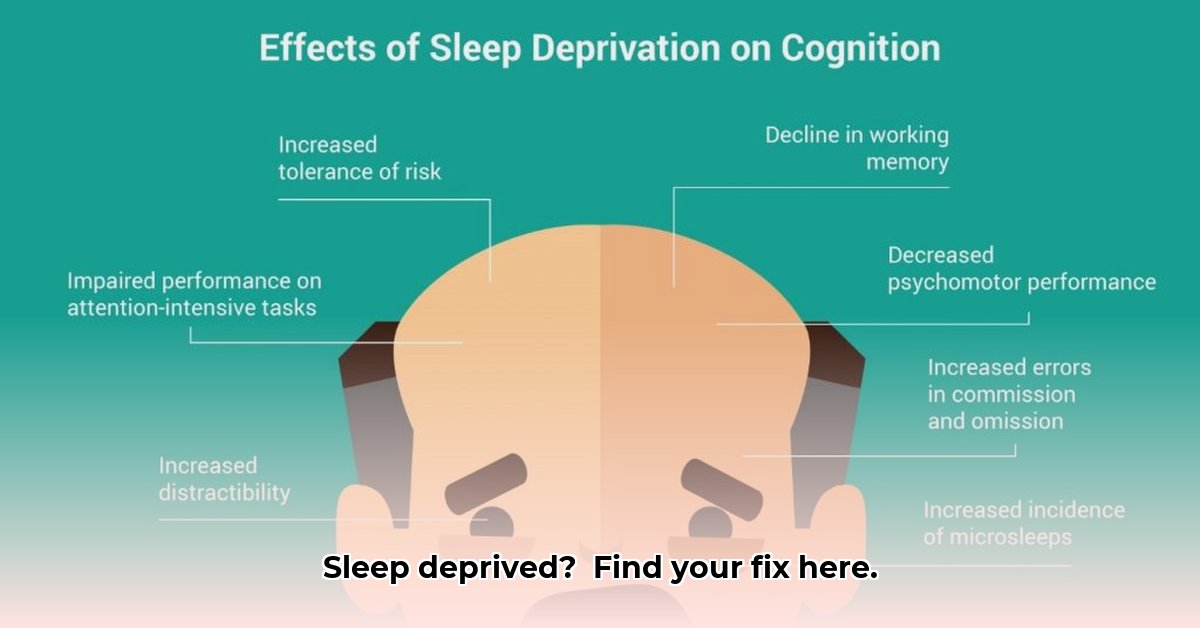
Eish, feeling completely knackered? Like you're running on empty and your brain's feeling a bit fuzzy? Jy's nie alleen nie! Many South Africans struggle with sleep deprivation, and it's not just about feeling tired; it impacts everything from your work performance to your long-term health. This comprehensive guide explains what sleep deprivation is, its effects, and, importantly, how to get your sleep back on track and stay there. We'll cover the stages of sleeplessness, short- and long-term consequences, and practical tips to improve your sleep – and prevent future problems. Let's get you feeling sharp, energetic, and ready to take on the world!
Understanding the Impact of Insufficient Sleep
Feeling more than just tired? Let's talk about sleep deprivation – what it is and how to fix it. It's not just about feeling sluggish; it's a serious issue affecting your mind and body.
Stages of Sleep Deprivation: From Yawns to… Uh Oh
Think of sleep deprivation as a gradual decline. Initially, you might feel slightly sleepy and less sharp. Next, your focus suffers – concentrating feels like wrestling a greased weaner! Simple tasks become harder, and your decisions might be… less than stellar.
As it worsens, mood swings become more dramatic, irritability increases, and you might even experience hallucinations (seeing or hearing things that aren't there) – definitely not a good sign! Your brain's screaming for a break! In extreme cases, sleep deprivation mimics mental health issues. The longer it lasts, the more serious the consequences become. The severity depends on the amount of sleep lost; one bad night differs greatly from weeks of poor sleep. It's the cumulative effect that really hits hard.
How Sleep Deprivation Affects Your Life
What happens when you consistently skimp on sleep? A whole heap of trouble! Your body is like a machine; sleep is its essential maintenance. Without it, things start breaking down.
Your brainpower takes a hit – memory, concentration, and problem-solving abilities all suffer. Productivity at work or school drops, errors increase, and riskier decisions become more likely. Your immune system weakens, making you more vulnerable to illness. Your metabolism might be affected, increasing the risk of weight gain, heart problems, and other health issues. Mentally, you're more prone to anxiety, depression, and increased stress. Sleep deprivation isn't just tiredness; it's a chain reaction of negative effects.
Did you know? Even a single night of poor sleep can impair cognitive function, making you less alert and more susceptible to accidents. [Source: National Sleep Foundation - insert relevant link here]
Are You Sleep Deprived? Self-Assessment
Is your day a constant struggle? Do you find it hard to concentrate? Are your emotions all over the show? Feeling grumpier than usual? These could be warning signs.
The symptoms depend on the amount (and quality!) of sleep you're getting. One bad night might leave you a bit sluggish. But chronic sleep deprivation can lead to serious health problems. It's not just how much sleep, but also how well you sleep. Frequent waking or tossing and turning? This impacts sleep quality as much as the hours slept.
Recovering and Preventing Sleep Deprivation: Practical Steps
So, you've realised you're sleep-deprived – now what? Don't stress, it's fixable!
Getting Your Sleep Back on Track
1. Consistent Sleep Schedule: Go to bed and wake up at roughly the same time daily, including weekends. This regulates your body's natural sleep-wake cycle.
2. Relaxing Bedtime Routine: Create a calming routine – a warm bath, reading, quiet music, or gentle stretching. Find what works for you.
3. Sleep Sanctuary: Ensure your bedroom is dark, quiet, and cool. Invest in a comfortable bed and bedding.
4. Ditch the Screens: Blue light from devices interferes with melatonin production, a hormone crucial for sleep.
5. Avoid Caffeine and Alcohol Before Bed: These disrupt sleep patterns.
6. Regular Exercise: Physical activity improves sleep, but avoid intense workouts close to bedtime.
7. Seek Professional Help: If you struggle with insomnia or other sleep problems, see a doctor or sleep specialist. They can help diagnose and create a personalized treatment plan. Cognitive Behavioural Therapy for Insomnia (CBT-I) is very effective. [Source: Mayo Clinic - insert relevant link here]
Fact: Establishing a regular sleep schedule can significantly reduce insomnia symptoms and improve sleep quality.
Preventing Future Sleep Deprivation: A Proactive Approach
Prevention is easier than recovery! These lifestyle changes support long-term health and well-being. Prioritising sleep isn’t laziness; it’s essential for a healthy life.
Key Takeaways:
- Sleep deprivation progresses in stages, becoming increasingly severe with prolonged sleep loss.
- Even short-term sleep deprivation impacts alertness and cognitive function.
- Chronic sleep debt drastically increases the risk of health problems.
- Recovery involves a multi-faceted approach.
- Good sleep habits are essential for both recovery and prevention.
- Severe sleep problems require professional help.
Remember, consistent sleep habits are key to recovery and preventing future problems. Prioritise your rest; it's not a luxury, but a necessity for a thriving life.